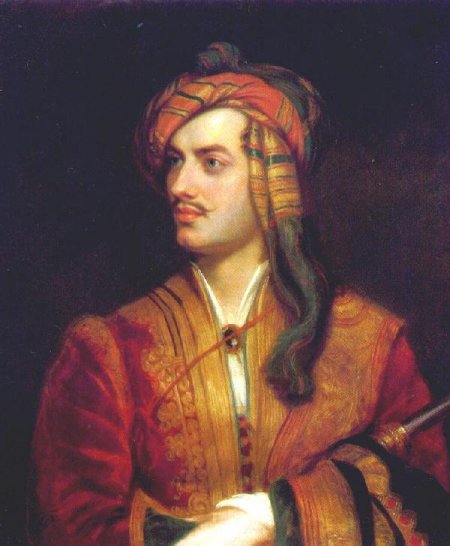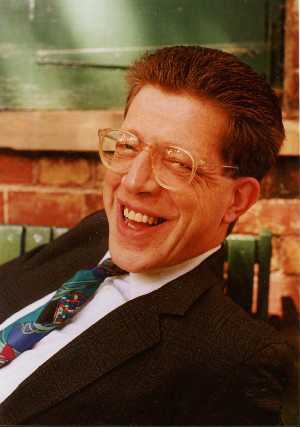
 |
| George Gordon Noel 6th Baron Byron (Jan. 22, 1788 – April 19, 1824) was an Anglo-Scottish poet and leading figure in Romanticism. |
I’ve been using Byronik™ as a nickname for my online persona since I first ventured onto the Internet in 1995. It is my intellectual property. I have established it internationally as a brand on my Web site, BYRONIK.COM. But when people ask what it actually means, there’s no short answer.
Let’s start at the end. Nik is a suffix used to form nouns that refer, usually derisively, to a person who espouses a cause, represents an attitude, or is an ardent enthusiast of the thing indicated by the initial element. A typical example is the late-1950s neatnik ‘a person who is overly neat.’
The suffix -nik is derived from Yiddish, where it is used to form personal nouns; it is ultimately from Slavic languages that were in contact with Yiddish. There are various words using the -nik suffix that are much earlier than Sputnik. To choose three examples, all-rightnik, meaning ‘a smug, nouveau riche person,’ is first recorded in 1918 and is found a number of times before Sputnik; no-goodnik ‘a worthless person; good-for-nothing’ dates from the 1930s (and is possibly based on or influenced by Russian negódnik in the same sense); and the nonce word real-estatenik is found in Jewish-English use in the 1920s.
The Russian satellite Sputnik, launched in 1957, has the same last element that is the source of the Yiddish -nik; the word literally means ‘traveling companion’, from elements meaning ‘together’ and ‘way; route’, and the agentive suffix -nik. The launch of Sputnik was a huge news event in the United States, and help spur America’s own space efforts and an educational emphasis on math and science. The popularity of the word Sputnik helped establish -nik in American English; the most notable early example was beatnik, coined by the late San Franciso newspaperman Herb Caen early in 1958 from Beat Generation and -nik. Some other, post-Sputnik uses include peacenik, artnik, nuclear-freezenik, (video) arcadenik, and filmnik.1
What about the Byron bit?
For generations, my family was ashamed of its rumored link with the poet Byron (1788 - 1824). But, for a teenaged slacker in the 1970s, there seemed to be some mileage in affecting the Byronic pose. By and large, I spent the next 30 or so years growing out of it.
 |
| Hannah, center, with daughter Kate and son Benjamin |
But in 1993, the author Susan Normington brought out a book called “Byron’s Children” (Alan Sutton, London, 1993) which attempted to show that my alleged ancestor William was one of Byron’s illegitimate sons born of a family servant named Helen who died in 1805, when Byron was still only 17. William, a man with no name, must have been something of a cowboy because he took the surname Marshall and settled down as a dairyman near the Borough Road in London SE1. His daughter Hannah used to walk the cows to pasture in Camberwell. Hannah Marshall was my great-great-great grandmother and she lived in shame of her father’s illegitimacy until she died in 1934 aged 98.
Normington’s book was reviewed at length in The Daily Telegraph of June 29, 1995,2 by an academic and part-time journalist Christina Hardyment. Hardyment interviewed my father and me for her piece. When she asked me if I’d ever written any poetry, I let her see some of the verse that I used to perform on the London circuit in the early 1980s — but I didn’t give her permission to reproduce any of it. I certainly had no pretension that it ranked with Byron's poetry.
The Telegraph is a conservative newspaper and its staff, perhaps mockingly, chose to label me as a “poet and activist.” When they selected the photo of me, they were probably looking for a profile they could juxtapose with Byron’s head to show whether there was some resemblance. Actually, I resemble my mother’s family.
If anybody is wondering why I’m wearing those boots with that suit, I need to explain that I was late for work on the morning of the shoot. I had put on the boots because one of the soles of my good shoes was flapping and I didn’t have time to glue it. I had expected the newspaper would just want a head shot. And I never dreamed photographer Charles Hopkinson would get my boots in the frame.
 |
| Charles Hopkinson took a whole bunch of photos of me in Cartwright Gardens during my lunch hour. Why didn't the picture subs at the Telegraph choose this one? |
So, what should have been a simple book review was oddly blown up in the national broadsheet press as a full-page story that attacks my verse for not being as good as the poetry of my alleged ancestor. Hardyment wrote, "Michael's poetry, however, makes no attempt at finesse, the Byron genes may have suffered in their dilution down the generations." The notion that there might be some kind of poetry gene seemed so ridiculous that I still quote it on my Web page. Some people think it's a mistake to show off an obviously negative remark about my lack of talent. They just don't get it. I'm extremely flattered that something I wrote was even deemed worthy of derisory comparison.
And this was around this time that I was spending a lot of time chatting online with people all over the world, and I had no clear notion of a nickname. You have to have a memorable nickname on Internet Relay Chat. The sort of handles I was experimenting with were TheLimey, Harry Palmer, Raffles. And, in literature there’s a certain kind of idealized but flawed anti-hero character described as Byronic.3 His attributes may or may not include:
· having conflicting emotions, bipolar tendencies, or moodiness
· self-critical and introspective
· struggles with integrity
· having a distaste for social institutions and social norms
· being an exile, an outcast, or an outlaw
· a lack of respect for rank and privilege
· having a troubled past
· being cynical, demanding, and/or arrogant
· loner, often rejected from society
For my online persona in the chat rooms of cyberspace, it seemed to work. And so I've stayed with Byronik and registered the domain.
But, having survived into middle age, I should own up that I’m too old to be truly Byronic. Lord Byron was dead 14 years by the time he was my age. A Romantic, by definition, must live fast, die young and leave a good-looking corpse.
Nearly 10 years expatriated in San Diego look more rather more like semi-retirement than Byronic exile.
I’m getting a little too heavy in the mid section to be climbing the ivy-covered walls to milady’s window. And milady expects a man of 50 to be a competent provider rather than a compulsive adventurer.
If we learn anything from the commedia dell'arte, it's that the amorous roué becomes a ridiculous figure if he persists into old age. And the enigmatic melancholy of the Byronic pose seems less attractive in a grumpy old man. Quixotik may be a more appropriate nickname when fading eyesight prompts me to question whether I’m tilting at windmills.
1 http://www.randomhouse.com/wotd/index.pperl?date=19980601
2“Byron’s lost family: a poetic mystery,” The Daily Telegraph June 29, 1995.
3http://en.wikipedia.org/wiki/Byronic_hero